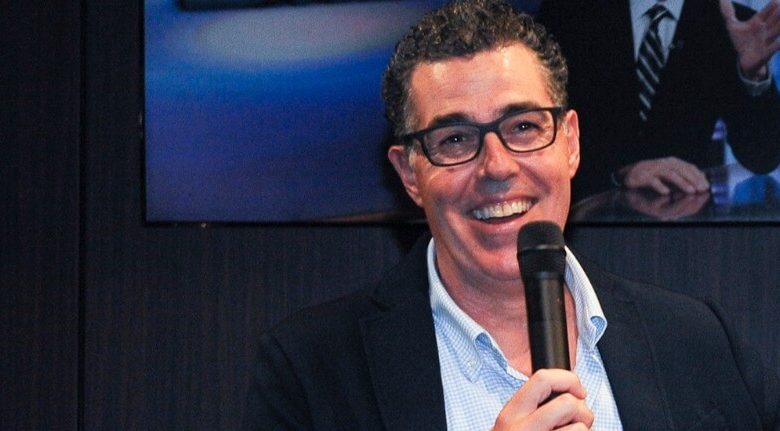Carolla Stands Up to Woke Blackface Bullies

Party costumes are more than silly fun in modern times. They can be career-damaging choices.
We saw that play out last year when NBC’s Megyn Kelly initiated a simple chat about darkening your skin to play a popular figure. She lost her job as a result. She left NBC with a handsome parting gift – $69 million remaining on her contract.
Kelly’s ratings never matched her exorbitant contract. The NBC suits likely used the blackface controversy to start anew.
The costume cudgel also strikes at random targets. Remember how Julianne Hough apologized for dressing up as an “Orange Is the New Black” character? And, as we saw over the last 48 hours, your job as governor can be in jeopardy if caught donning blackface, no matter the time period.
Adam Carolla isn’t having it.
The star of the upcoming “No Safe Spaces” once dressed up as Mr. T, darkening his skin to complete the illusion. The topic began on Twitter when one of his followers asked if he worried about his own blackface past. Gov. Ralph Northam’s disastrous press conference still hung in the cyber air.
Carolla seemingly acknowledged why it could be a problem for him. Then he dug in his heels.
People think I am a racist anyway. I didn’t dress as a random black man. I dressed as Mr.T who is black. Because I loved Mr.T. If you find that PROBLEMATIC fuck off https://t.co/yY14p3OUGl
— Adam Carolla (@adamcarolla) February 2, 2019
Carolla may be referencing NPR’s unsuccessful attempt to paint him as a racist via a botched interview sting.
The podcaster continued:
and ken I didn’t mean you. I meant all the Woke people. https://t.co/yY14p3OUGl
— Adam Carolla (@adamcarolla) February 2, 2019
This Tweet suggests Carolla’s costume happened before his career took off. He’s been blunt about his anemic finances, a condition that lasted until his early 30s.
I used burnt cardboard to color my hole body and grew a beard and gave my self a mohawk. could not afford paint https://t.co/f0TljiBGZo
— Adam Carolla (@adamcarolla) February 2, 2019
Later, Carolla brought context into the conversation.
I draw a distinction between black face and going as OJ Simpson for halloween. am I missing something? https://t.co/T3ZIk2aSHT
— Adam Carolla (@adamcarolla) February 3, 2019
Of course, context matters. It’s critical to any conversation. That’s even more true for one as delicate as blackface in American culture. Yet too often context is shoved aside to score cultural or political points.
Let’s not do that here.
There’s a huge difference between someone dressing up as a character for Halloween and blackface, a term tied to a deeply racist practice. Blackface recalls an era where discrimination ran rampant in the United States and white artists co-opted black culture.
The practice’s early history is more demeaning than some realize.
The first minstrel shows were performed in 1830s New York by white performers with blackened faces (most used burnt cork or shoe polish) and tattered clothing who imitated and mimicked enslaved Africans on Southern plantations. These performances characterized blacks as lazy, ignorant, superstitious, hypersexual, and prone to thievery and cowardice. Thomas Dartmouth Rice, known as the “Father of Minstrelsy,” developed the first popularly known blackface character, “Jim Crow” in 1830. By 1845, the popularity of the minstrel had spawned an entertainment subindustry, manufacturing songs and sheet music, makeup, costumes, as well as a ready-set of stereotypes upon which to build new performances.
By 21st century standards, any time a white person darkens their skin, even to evoke a popular figure, it’s problematic given heightened race sensibilities. That wasn’t case as recently as the late 20th century. Billy Crystal, a beloved entertainer, darkened his skin to portray Sammy Davis, Jr., for example. Very few people objected to the impression.
RELATED: Carolla on the PC Police: ‘You Retreat, They Encroach’
More recently, Carolla’s former “Man Show” partner Jimmy Kimmel darkened his skin to portray NBA great Karl Malone. He’s yet to catch serious retro flack for that impression, which he repeated for his Comedy Central show.
Those two examples are tied to specific impressions. What we’ve seen with Northam’s current yearbook imbroglio is different. He’s not portraying a specific person, and the KKK connection is chilling.
It’s why he’ll likely resign sooner than later. It’s also why Carolla is standing his ground. Again.
